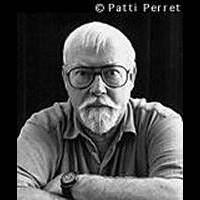
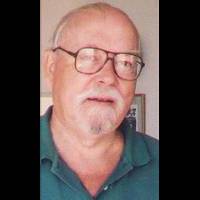
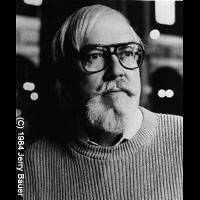
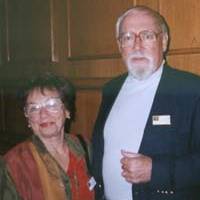
Harry Harrison




Life as a science fiction writer:
Harry Harrison was born in Stamford, Connecticut, on March 12, 1925. First gaining popularity in John W. Campbell's Astounding/Analog magazine, he then went on in the 70's to gain his first real fame with the stories of "The Stainless Steel Rat", a series of novels chronicling the adventures of a character named Slippery Jim DiGriz. You can read the original short story by clicking HERE. A self-proclaimed pacifist and atheist, many of his works also set out to portray themes more serious than his comic-book renderings. Some such novels are The Streets of Ashkelon and In Our Hands, the Stars.
Some of his other famous works include the West of Eden trilogy, Bill, the Galactic Hero, and Make Room! Make Room!, the novel from which "Soylent Green" was based. A complete list of Harrison's works can be found here.
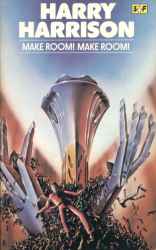
"Make Room! Make Room!"
(Excerpt taken from Harry Harrison.com)
PART ONE
The August sun struck in through the open window and burned on Andrew Rusch's bare legs until discomfort dragged him awake from the depths of heavy sleep. Only slowly did he become aware of the heat and the damp and gritty sheet beneath his body. He rubbed at his gummed- shut eyelids, then lay there, staring up at the cracked and stained plaster of the ceiling, only half awake and experiencing a feeling of dislocation, not knowing in those first waking moments just where he was, although he had lived in this room for over seven years. He yawned and the odd sensation slipped away while he groped for the watch that he always put on the chair next to the bed, then he yawned again as he blinked at the hands mistily seen behind the scratched crystal. Seven ... seven o'clock in the morning, and there was a little number 9 in the middle of the square window. Monday, the ninth of August, 1999 - and hot as a furnace already, with the city still imbedded in the heat wave that had baked and suffocated New York for the past ten days. Andy scratched at a trickle of perspiration on his side, then moved his legs out of the patch of sunlight and bunched the pillow up under his neck. From the other side the room in half there came a clanking whir that quickly rose to a high-pitched drone.
"Morning ... " he shouted over the sound, then began coughing. Still coughing he reluctantly stood and crossed the room to draw a glass of water from the wall tank; it came out in a thin, brownish trickle. He swallowed it, then rapped the dial on the tank with his knuckles and the needle bobbed up and down close to the Empty mark. It needed filling, he would have to see to that before he signed in at four o'clock at the precinct. The day had begun.
A full-length mirror with a crack running down it was fixed to the front of the hulking wardrobe and he poked his face close to it, rubbing at his bristly jaw. He would have to shave before he went in. No one should ever look at himself in the morning, naked and revealed, he decided with distaste, frowning at the dead white of his skin and the slight bow to his legs that was usually concealed by his pants. And how did he manage to have ribs that stuck out like those of a starved horse, as well as a growing potbelly - both at the same time? He kneaded the soft flesh and thought that it must be the starchy diet, that and sitting around on his chunk most of the tune. But at least the fat wasn't showing on his face. Its forehead was a little higher each year, but wasn't too obvious as long as his hair was cropped short. You have just turned thirty, he thought to himself, and the wrinkles are already starting around your eyes. And your nose is too big - wasn't it Uncle Brian, who always said that was because there was Welsh blood in the family? And your canine teeth are a little too obvious so when you smile you look a bit like a hyena. You're a handsome devil, Andy Rusch, and when was the last time you had a date? He scowled at himself, then went to look for a handkerchief to blow his impressive Welsh nose.
There was just a single pair of clean undershorts in the drawer and he pulled them on; that was another thing he had to remember today, to get some washing done. The squealing whine was still coming from the other side of the partition as he pushed through the connecting door.
"You're going to give yourself a coronary, Sol," he told the grey-bearded man who was perched on the wheelless bicycle, pedalling so industriously that perspiration ran down his chest and soaked into the bath towel that he wore tied around his waist.
"Never a coronary," Solomon Kahn gasped out, pumping steadily. "I been doing this every day for so long that my ticker would miss it if I stopped. And no cholesterol in my arteries either since regular flushing with alcohol takes care of that. And no lung cancer since I couldn't afford to smoke even if I wanted to, which I don't. And at the age of seventy-five no prostatitis because ..."
"Sol, please - spare me the horrible details on an empty stomach. Do you have an ice cube to spare?"
"Take two - it's a hot day. And don't leave the door open too long."
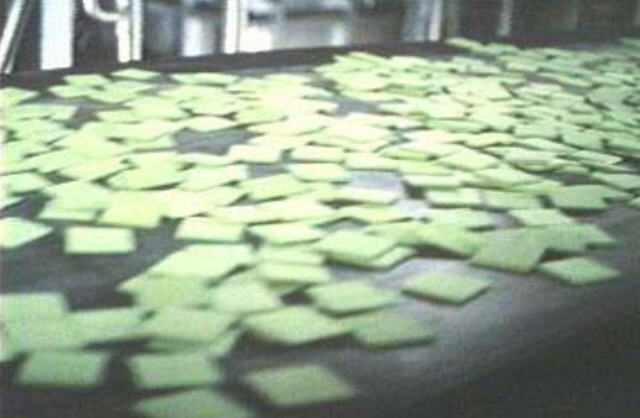
But What About Soylent Green?
Harry Harrison's Novel, Make Room! Make Room!, served as the basis for screen writer Stanley R. Greenberg's vision of the film, "Soylent Green". Many aspects of this story, however, were added to create more of a "thematic quality" to the overall plot. Elements such as the "people crackers", and the furniture girls weren't present in Harrison's work.
How did Harrison feel about these additions and other such changes to his novel in the film rendition Greenberg created?
"Although forbidden by contract to make any changes in the script, I nevertheless pointed out a number of inaccuracies and mistakes I discovered. Credit goes to the filmmakers for taking instant action on them. The film's opening is a prime example. In the original script the action began in Manhattan, no date given. I pointed out to Walter Seltzer that my novel was special specifically because it took place in the very near future, at the turn of the century. By ignoring this element, the film would lose the sense of immediacy and relevance for which the rights to my book had, presumably, been purchased in the first place." - Harry Harrison
These, and many other aspects, were addressed by Harry Harrison to the filmmakers concerning the discrepancies in the film and also discussed in an article in Omni's Screen Flights - Screen Fantasies: The Future According to SF Cinema, titled "A Cannibalized Novel becomes Soylent Green". Nevertheless, the ideas and concerns for the future that Harry Harrison originally put across in his novel combined with screen writer, Greenburg, and director, Fleischer, join together to create the vision of Soylent Green that we know today.